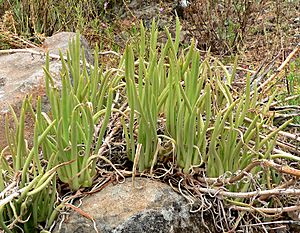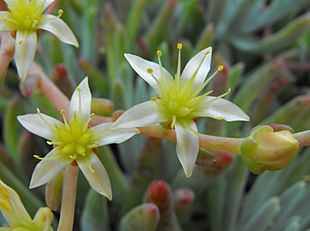Fingertips facts for kids
Quick facts for kids Fingertips |
|
|---|---|
 |
|
| Scientific classification |
|
| Kingdom: | Plantae |
| Clade: | Tracheophytes |
| Clade: | Angiosperms |
| Clade: | Eudicots |
| Order: | Saxifragales |
| Family: | Crassulaceae |
| Genus: | Dudleya |
| Species: |
D. edulis
|
| Binomial name | |
| Dudleya edulis (Nutt.) Moran
|
|
| Script error: The function "autoWithCaption" does not exist. | |
| Synonyms | |
|
|
Script error: No such module "Check for conflicting parameters".
Dudleya edulis is a cool succulent plant often called fingertips. It gets this name because its leaves look like green fingers pointing upwards!
Contents
Where Fingertips Grow
This plant is special because it only grows in certain places. It is found in chaparral habitats. These are natural areas in southwestern Southern California. You can also find it a little bit in northwestern Baja California.
Dudleya edulis loves rocky places. It grows on slopes, in soil, and on rock outcrops. You can see it from sea level up to about 4,265 feet (1,300 meters) high. It lives near the coast and in mountain ranges. These include the Santa Ana Mountains and Cuyamaca Mountains. It also grows on San Clemente Island.
You'll find it in areas with coastal sage scrub. It also lives in chaparral and woodlands habitats.
What Fingertips Look Like
The Dudleya edulis plant has many thick, finger-shaped leaves. These leaves grow straight up from a short, thick stem. This stem is called a caudex. It is usually at or just below the ground.
The leaves are a pale green color. They are round like fingers and have a pointed tip. They can grow up to about 8 inches (20 centimeters) tall.
This plant also grows a tall flower stalk. It can be from 4 to 20 inches (10 to 50 centimeters) tall. This stalk has several branches. Each branch can hold up to 10 or 11 flowers. The flowers have pointed petals. They are white or cream-colored and about half an inch (1 centimeter) long. They usually bloom from May to July.
Sometimes, Dudleya edulis mixes with other Dudleya plants. This happens when their growing areas meet. It can create new types of plants.
Growing Fingertips Plants
People often grow Dudleya edulis as an ornamental plant. This means it's grown for its beauty. It's a great choice for native plant gardens. It also works well in wildlife gardens.
Because it's a succulent plant, it doesn't need much water. This makes it perfect for drought tolerant gardens. It's also popular in rock gardens. You can even grow it in pots!
Images for kids
-
Growing in habitat at Torrey Pines
-
The fruiting flowers of Dudleya edulis. Note the 5 ovaries.
See also
 In Spanish: Dudleya edulis para niños
In Spanish: Dudleya edulis para niños






